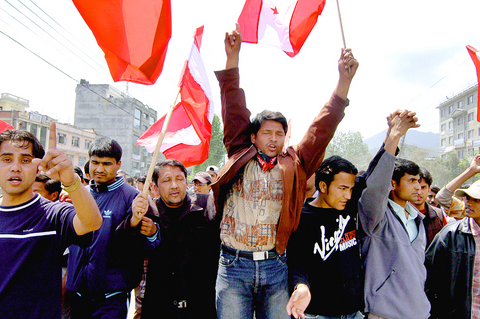Nepal's King Gyanendra, bowing to popular pressure, yesterday announced that he was handing back all executive power to the people.
In an address to the nation following over two weeks of anti-king protest demonstrations during which over a dozen people were shot dead, the 59-year old Nepalese monarch said: "We ask the seven agitating political party alliance to recommend the name of the person to become prime minister."
The king seized absolute power in February last year asking for three years to bring the derailed Nepalese multi-party democracy back on track.

PHOTO: AP
More than 100,000 pro-democracy protesters had earlier defied a government curfew and filled the streets on the outskirts of Nepal's capital, as the US ambassador warned that the king's regime could be nearing collapse.
Three separate groups of marchers converged on an area on the western edge of Kathmandu called Kalanki, where police shot three demonstrators dead on Thursday and wounded dozens more.
A reporter estimated the crowd at more than 100,000; independent Kantipur television said there were about 150,000.
They faced off against security forces that had ringed the city issued with shoot-on-sight orders against anyone who tried to enter the curfew zone.
As the tension grew, so did the international pressure on the king.
Meanwhile, two senior opposition leaders involved in negotiations with communist rebels were arrested as they tried to return to Kathmandu, said Amrit Bohara of the Community Part of Nepal.
The two men, Jhala Nath Khanal and Bamdev Gautam, both leaders of the party, have been important conduits in negotiations between Nepal's seven main opposition parties and the Maoist insurgents who control much of the countryside.

Conflict with Taiwan could leave China with “massive economic disruption, catastrophic military losses, significant social unrest, and devastating sanctions,” a US think tank said in a report released on Monday. The German Marshall Fund released a report titled If China Attacks Taiwan: The Consequences for China of “Minor Conflict” and “Major War” Scenarios. The report details the “massive” economic, military, social and international costs to China in the event of a minor conflict or major war with Taiwan, estimating that the Chinese People’s Liberation Army (PLA) could sustain losses of more than half of its active-duty ground forces, including 100,000 troops. Understanding Chinese

The Ministry of Foreign Affairs (MOFA) yesterday said it is closely monitoring developments in Venezuela, and would continue to cooperate with democratic allies and work together for regional and global security, stability, and prosperity. The remarks came after the US on Saturday launched a series of airstrikes in Venezuela and kidnapped Venezuelan President Nicolas Maduro, who was later flown to New York along with his wife. The pair face US charges related to drug trafficking and alleged cooperation with gangs designated as terrorist organizations. Maduro has denied the allegations. The ministry said that it is closely monitoring the political and economic situation

UNRELENTING: China attempted cyberattacks on Taiwan’s critical infrastructure 2.63 million times per day last year, up from 1.23 million in 2023, the NSB said China’s cyberarmy has long engaged in cyberattacks against Taiwan’s critical infrastructure, employing diverse and evolving tactics, the National Security Bureau (NSB) said yesterday, adding that cyberattacks on critical energy infrastructure last year increased 10-fold compared with the previous year. The NSB yesterday released a report titled Analysis on China’s Cyber Threats to Taiwan’s Critical Infrastructure in 2025, outlining the number of cyberattacks, major tactics and hacker groups. Taiwan’s national intelligence community identified a large number of cybersecurity incidents last year, the bureau said in a statement. China’s cyberarmy last year launched an average of 2.63 million intrusion attempts per day targeting Taiwan’s critical

‘SLICING METHOD’: In the event of a blockade, the China Coast Guard would intercept Taiwanese ships while its navy would seek to deter foreign intervention China’s military drills around Taiwan this week signaled potential strategies to cut the nation off from energy supplies and foreign military assistance, a US think tank report said. The Chinese People’s Liberation Army (PLA) conducted what it called “Justice Mission 2025” exercises from Monday to Tuesday in five maritime zones and airspace around Taiwan, calling them a warning to “Taiwanese independence” forces. In a report released on Wednesday, the Institute for the Study of War said the exercises effectively simulated blocking shipping routes to major port cities, including Kaohsiung, Keelung and Hualien. Taiwan would be highly vulnerable under such a blockade, because it